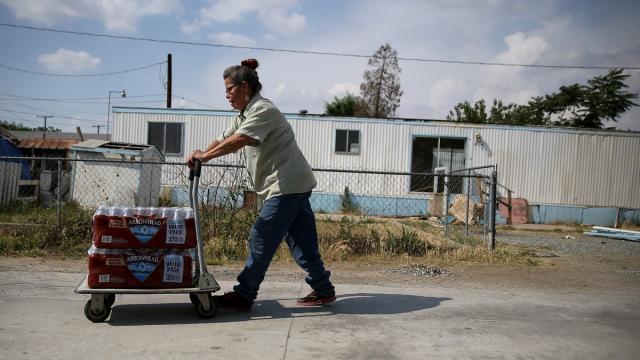
The proposed budget would slash social service spending, and could leave millions of Americans without health insurance. Photograph: Justin Sullivan/Getty Images
Donald Trump’s tax reform plans would, if enacted, increase the gap between rich and poor Americans and see the U.S. slip below Greece on a new global index of inequality.
According to the Commitment to Reducing Inequality (CRI) index, developed by researchers at Oxfam and Development Finance International, the US already distinguishes itself among wealthy countries by doing “very badly” at addressing inequality.
But it would fall a further six places from its ranking of 23rd overall if Trump’s tax reform effort is successful, with the U.S.’s specific rating on tax policies plummeting 33 places from 26th to 59th – just below Peru, Chile and Sri Lanka.
“When you already have countries like Portugal and Slovenia ranking higher than the United States on the overall index, we think that’s a concern considering the wealth of the U.S.,” Paul O’Brien, Oxfam America’s vice-president for policy and campaigns, told the Guardian.
If the White House passes its budget, which would slash social service spending and could leave millions of Americans without health insurance, the U.S. would fall behind Greece, which is crippled by a debt crisis; Spain, which for 10 months in 2016 did not have a government; and Argentina, which has been plagued by high inflation, according to the report.
O’Brien said global understanding of inequality has grown significantly in the past decade, but this awareness has not led to the creation of pervasive government policies. Compilers of the index spent a year looking at policies around taxation, social service spending and labor in 152 countries.
“The reason we did this comparative index,” O’Brien said, “is in large part to challenge policymakers like President Trump to look to other economies and other societies, to give people smarter ways to give everyone an opportunity to lift themselves from poverty.”
The U.S. performance on the index is strikingly bad compared to other wealthy countries, including the 35 members of the Organization for Economic Cooperation and Development (OECD). These countries account for 63% of the world GDP. The US is ranked 21st among them in the inequality index, despite being the wealthiest country in the history of the world.
Threaded through the new report are stark facts that explain some of the ways the U.S. has earned its low ranking. In 2012, 43.3% of corporations in the U.S. paid no federal income tax. U.S. employers are required to provide zero days of paid maternity leave, while Sweden offers 480 days. The U.S. federal minimum wage of $7.25 is well below the $10.60 an hour needed for a family of four to stay above the federal poverty line.
The report makes clear that inequality in the U.S. could get worse if efforts to reform tax and repeal the Affordable Care Act are successful. If, instead, Trump decided to attack inequality in the U.S., O’Brien said he would need to create a more progressive tax system that lessens the burden on the poorest people, improve labor laws, and “ensure that investments in healthcare, education and social protection gave all Americans an equal shot at the American dream.”
The index does not assess laws that prevent inequality, rather focusing on policies that help redistribute wealth. The report identifies successful efforts to turn around inequality in countries including Namibia, where secondary education is free to all.
The index also emphasizes that the top performing countries, including Sweden, Belgium and Denmark, have room for improvement and that the success they have had could be reversed through legislative attempts to weaken laws that protect the poorest members of society.
“For most rich countries,” the report says, “the main body of policies measured by the index was introduced in a different period of history, when significant action in these areas was broadly accepted as the right thing to do and paid dividends in terms of social and economic progress.
“Today, in many countries, political support for these measures has eroded.”
3 WAYS TO SHOW YOUR SUPPORT
- Log in to post comments













